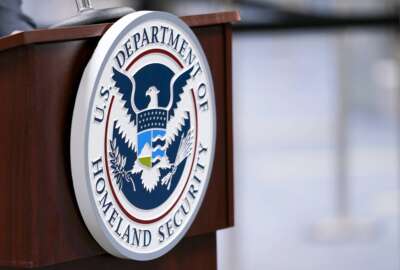
False Claims Act brings Justice Department $3 million from software giant Adobe
In today's Federal Newscast: The False Claims Act brings the Justice Department $3 million from software giant Adobe. The Government Publishing Office makes some...
- The inspector general community is facing an internal battle over integrity. Department of Homeland Security Inspector General Joseph Cuffari and two of his senior aides are suing the Council of Inspectors General on Integrity and Efficiency (CIGIE) over what their lawyers say are "baseless inquiries" into their conduct. CIGIE 's Integrity Committee has been probing multiple complaints against Cuffari, including his handling of the deleted Secret Service texts from the January 6 Capitol riot. Cuffari's lawsuit challenges the constitutionality of the Integrity Committee. Court documents show Cuffari began pushing back against the committee's probes as early as October 2020, just months after he started as DHS IG.(DHS inspector general’s lawsuit takes aim at oversight of the IGs - Federal News Network)
- The Justice Department was awarded $3 million from software giant Adobe, as part of a False Claims Act settlement. DoJ alleged Adobe made improper payments under its Solution Partner Program, to companies that had a contractual or other relationship with the government. This allowed these partners to influence federal purchases of Adobe software between January 2011 and December 2020. Three former Adobe managers brought the claims under whistleblower provisions of the False Claims Act. The three former managers will receive more than $555,000 as part of the settlement.
- The Government Publishing Office has secured the pieces and parts to ensure U.S. passports remain secure for the next decade. GPO awarded a 10-year contract to three companies: Infineon Technologies, which is the incumbent; Americas Corporation; and Thales USA for the security features that go into the passport cover, including the chips, software and packaging. GPO did not say how much the contract was worth, but did say the State Department issued a record number of 22 million passports in fiscal 2022 and is on track to break that number in 2023.(GPO awards contract for U.S. passport covers - Government Publishing Office)
- Agencies have new guidance from the White House on office arrangements. The Office of Management and Budget tells agencies to strike a balance on their telework versus in-office workplace policies. Agencies should consider increasing in-person work where it makes sense, while still maintaining flexible telework for eligible federal employees. Agencies have 30 days to update office arrangement plans for headquarters offices, and then report back to OMB.(White House tells agencies to strike a balance between telework, in-office work - Federal News Network)
- Plans for a new health insurance marketplace for Postal Service employees and retirees are coming together. Nearly two million postal enrollees in the Federal Employee Health Benefits Program will need to select a new health insurance plan under a new marketplace during next year’s Open Season period. OPM is putting plans for the Postal Service Health Benefits Program into focus, with the release of an interim final rule. The Postal Service Reform Act requires OPM to create the new health care marketplace and for all future postal retirees to enroll in Medicare Part B. OPM Associate Director for Health Care and Insurance Laurie Bodenheimer said the agency is preparing to ramp up its customer support ahead of the migration. “We absolutely want to do this right, with the best interests of the enrollees always in mind," Bodenheimer said.(OPM issues plan to migrate 1.7M FEHB enrollees into postal-only insurance marketplace - Federal News Network)
- Like many other agencies in the Best Places to Work rankings, the National Science Foundation's employee engagement and satisfaction score dropped off slightly. But NSF still placed second overall for midsize agencies in the Partnership for Public Service's 2022 rankings. Wonzie Gardner, the agency's chief human capital officer, said hybrid work may have led to the slight score decline. NSF is looking into more upskilling and reskilling opportunities for employees to try to boost the score next year.(National Science Foundation - Best Places to Work - Partnership for Public Service)
- The Defense Advanced Research Projects Agency wants some help with its plans to protect legacy computer programs from cyber attacks. The agency is soliciting proposals to develop tools that automatically compartmentalize software systems. The new compartmentalization and privilege management program will focus on securing the vulnerable legacy code base against cyber attacks. The program will run for four years, in two phases. Phase 1 will focus on technology development. Phase 2 will focus on demonstrating scalable capabilities on open-source systems. A broad agency announcement solicitation with program details is available on SAM.gov.
- A new laboratory will support scientific and logistic operations for the Defense Centers for Public Health in Aberdeen, Maryland. The lab will serve most of the center’s directorates including: Environmental Health Sciences and Engineering, Occupational Health Sciences, and Laboratory Sciences and Toxicology. It will provide combatant commands with near real-time disease and bio-surveillance threat information to prevent disease and hazards for the military. In addition to labs, the new facility will include conference rooms, huddle rooms, breakrooms and a 50-person classroom for internal and external training courses.
- The Postal Service is gearing up for a mostly electric next-generation fleet of delivery vehicles. But the Government Accountability Office said USPS still needs to figure out what this change means for its facilities. Postal officials said letting the general public use postal-charging stations would be challenging and offer little benefit. USPS, however, is exploring the possibility of letting its employees charge their own personal vehicles during the workday. The Postal Service expects 75% of its next-generation fleet to be electric vehicles.
- New legislation would create a Law Enforcement Mental Health and Resiliency Program at the Department of Homeland Security. The bipartisan DHS Suicide Prevention and Resiliency for Law Enforcement Act was introduced in both the House and Senate this week. The proposed program would make mental health and wellness services more accessible to thousands of DHS law enforcement personnel. It would also require each DHS component to assign a representative to the program to ensure sharing of best practices and resources across the department. (Peters, Hawley, Thompson, Garbarino introduce bipartisan, bicameral bill to expand mental health support for DHS law enforcement - Senate Homeland Security and Governmental Affairs Committee )
Copyright © 2025 Federal News Network. All rights reserved. This website is not intended for users located within the European Economic Area.
Peter Musurlian
Peter Musurlian is a producer at Federal News Network.
Follow @PMusurlianWFED





